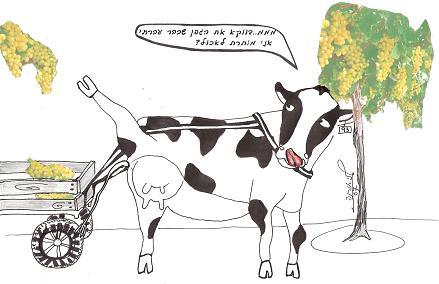
A laborer who harvests grapes in a vineyard is permitted, according to Torah law, to eat from the grapes which he is harvesting and this is not considered to be stealing from his employer, for it is written “When you enter another man’s vineyard, you may eat as many grapes as you want, until you are full, but you must not put any in your vessel” (Deuteronomy 23:25). The early sages (the Tanaaim) ruled that if a laborer is harvesting figs he may not eat grapes, and if he is harvesting grapes he may not eat figs. The scholars asked: May a laborer who is harvesting grapes from one vine eat grapes off a different vine in the same vineyard? What are the issues under debate? In the interpretation of the above verse we could understand that the laws of the Torah permit the laborer to eat the type of fruit which he is harvesting, or we can understand it as saying that the laws of the Torah only allow him to eat from the plant which he is harvesting into his vessel. Other scholars asked: If a laborer who is harvesting from one vine is forbidden to eat from another, how can an ox eat while working? The ox is hitched to the front of the cart from which the laborer works and is in front of the vine upon which the laborer works. You are forced to conclude, the scholars said, that one may eat even from a vine which one is not actively harvesting. The scholars answered that this is no proof, for there are situations in which an ox could eat from the vine the laborer is harvesting, such as a very long vine which the laborer is harvesting from behind and the ox is eating from the front. The scholars attempted to decide which side was correct from the words of the early sages (the Tanaaim). In the Mishnah it is written “If he is harvesting figs — he may not eat of the grapes.” This implies that if one is harvesting a fig tree he may not eat of a vine located elsewhere. Therefore we should conclude that if there were a fig tree in a different location he may eat of its figs. The scholars rejected this proof, arguing that the early sages made their ruling in a world in which the grapevine rests upon the fig tree as do climbing plants — and both are in the same place — so while he fills his basket with the figs he is harvesting he must separate the grape leaves from the fig leaves — and in this situation the Mishnah rules that one who harvests figs may not eat of the grapes. The scholars continued to try and answer the doubt from the words of the early sages. In the Mishnah it is written: “But he may restrain himself until he comes to the choice quality [fruit], and then eat.” Because it says “restrain himself,” it implies that the laborer waits until he reaches a vine whose grapes are choice; were it permitted to eat of the fruit of a different vine, he would simply go, take some choice grapes, and return to work on the vine which he is harvesting while eating. The scholars answered that of course one is forbidden to go to a different vine and eat because the worker is thus wasting his employer’s time. The question above is in a case where the laborer’s family is with him while he harvests; they could pick the choice grapes for him while he works, so there is no waste of the employer’s time. The scholars tried to settle this doubt from the words of the early sages, who as a rabbinical edict permitted the laborer to eat grapes while he walks from row to row in the vineyard. The scholars argued that this implies that the laborer may eat while walking to a different row only due to rabbinical edict, but according to the Torah’s laws the laborer may not eat of grapes he harvested in one row while walking to another, though walking from one row to the next is part of the job. The scholars rejected this proof and argued that walking from row to row is not considered part of the job and that, therefore, is the reason that according to the Torah’s laws he is not permitted to eat while walking.
(Talmudic issues were handed down orally from scholar to scholar and only in a later era were they edited and written down. Naturally, people forget and the issues were distorted and imprecise; different versions were created. Alternate versions of issues begin with the words “Some say.”)
Some say the opposite — at first the scholars thought that walking is not part of the job and that the laborer is not considered to be working as he walks, so he is forbidden to eat as he walks, even according to Torah law, but the sages ruled that he may. While he is actually harvesting, though, he may eat from the grapes of a different vine. The scholars rejected this proof, arguing that walking is considered part of the job, yet he is only permitted to eat while walking due to rabbinic edict. This implies that one who moves from row to row to harvest is considered to be harvesting from one vine while eating from another, and this is forbidden according to the Torah’s laws.
(Babylonian Talmud, Tractate Bava Metzia 91b-92a)
